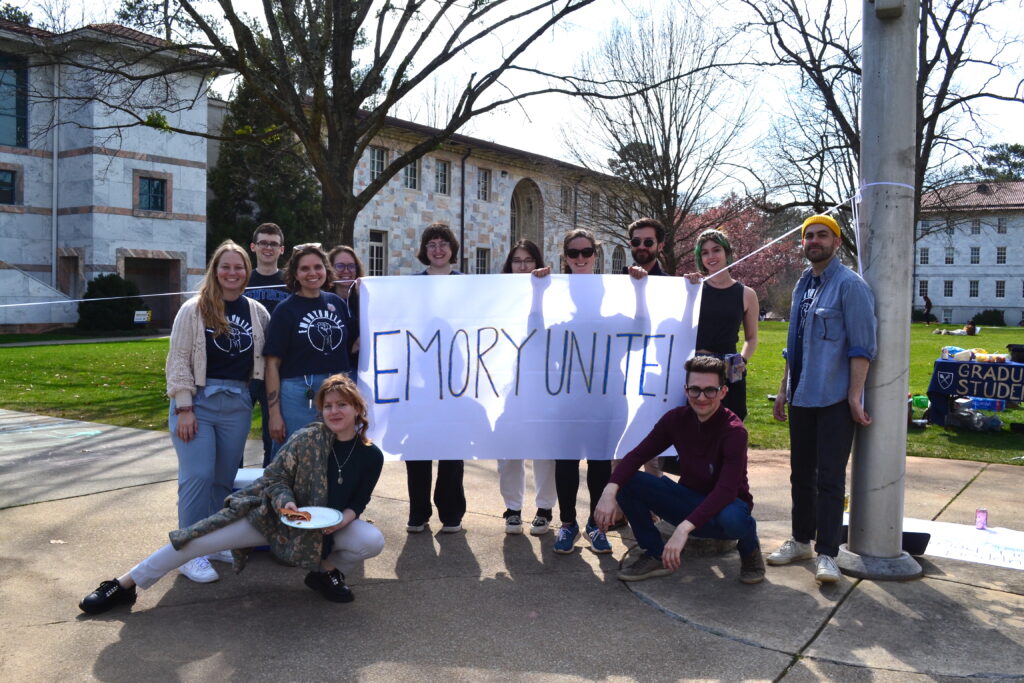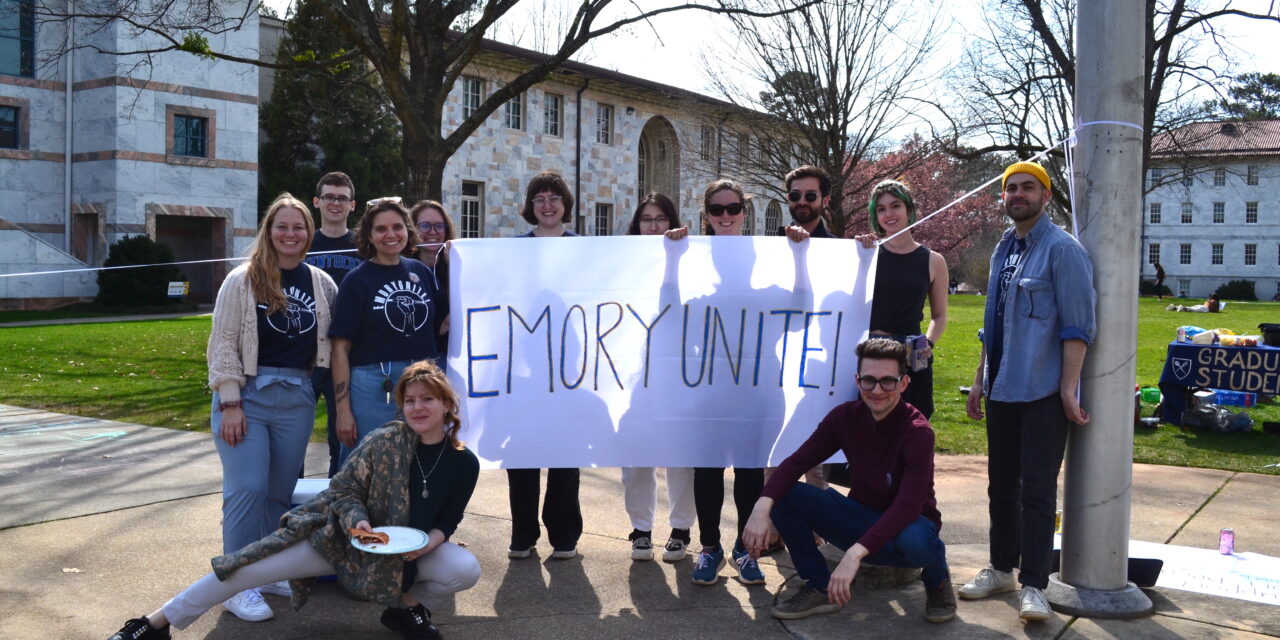A student union based out of Emory University’s Laney Graduate School filed a petition with the National Labor Relations Board (NLRB) on Aug. 25 to vote on whether they should form a majority union. Emory Unite! represents Ph.D. students who have historically been paid below Atlanta’s living wage.
The group’s next step is meeting with the NLRB and the Emory administration to negotiate an election date to formally reach union status. Union organizer Elijah Ullman (25G) said he wants to hold the vote “as soon as possible.”
The discussions with the NLRB and administration could include deciding which Ph.D. students will qualify to vote in the election. The NLRB recognizes graduate students as employees when they are actively employed by the University through means such as working in a lab or teaching a class, according to labor historian and Associate Professor of Modern Latin American History Thomas D. Rogers. This means that graduate students’ bargaining units — groups of employees represented by a union — are more fluid, with students moving in and out as they begin and finish employment within their program.
During Duke University’s (N.C.) successful graduate student unionization election in July, doctoral students employed by the University to teach or provide research services during spring 2023, fall 2022 or spring 2022 were eligible to vote.
Rogers said the debate about which Ph.D. students qualify will likely reemerge during stipend negotiations if EmoryUnite! earns recognition during the election.
“All of those are stumbling blocks on the way to say, ‘What we need is to be paid a living wage overall, that the stipend levels for everybody should be at the living wage level every single year for every single student,’” Rogers said.
University President Gregory L. Fenves said in a recent interview with the Wheel that he expects an announcement regarding the election “fairly soon” due to ongoing negotiations. He said that his goal is to ensure all graduate students have the necessary information to make a decision.
“It is an important decision, not only for students that are here, but all future students who are going to be coming to Emory,” Fenves said. “So we don’t have a position one way or the other, other than to say that students need to make an informed decision about what does it mean to be a member of a union and collective bargaining, and how is that going to impact their graduate education individually at Emory?”
Ullman explained that establishing an official union would allow graduate students to address problems with “meaningful power,” as Emory administration would be required to bargain with the group.
“It is all up to administrators who aren’t living the experiences that students are,” Ullman said. “It might have been 10, 20, 30 years ago that they were a graduate student, so things are a very different situation. And, again, the important question: Shouldn’t we have a say with what happens to us and in the future?”
Over half of the Ph.D. students signed EmoryUnite!’s card drive in support of unionization last semester, exceeding the 30% required to qualify for filing a petition to schedule an election. If over half of the students voting in the future election vote in support of unionization, EmoryUnite! will be recognized as a majority union.
“There’s a difference between signing the card and signing the ballot, but [I’m] cautiously optimistic based upon the wave of union support in the last several years,” Ullman said.
Emory community response
Provost and Executive Vice President for Academic Affairs Ravi V. Bellamkonda sent Ph.D. students an email in response to the petition’s filing, acknowledging their effort. In an email to the Wheel, Bellamkonda wrote that the University honors and respects students’ right to discuss unionization.
“We are committed to working with our students on this process, and regardless of the outcome, to continuing to deliver high quality, student-centered doctoral education at Emory,” Bellamkonda wrote to the Wheel. “We prize the relationship between not only doctoral students and the Laney Graduate School, but also between students and their departments, faculty, advisors and more. We view unionization in light of how it may impact these trusted relationships.”
Bellamkonda added that Emory is following the processes established under the National Labor Relations Act. The University publicly responded in an Aug. 30 press release, writing that Workers United filed the petition with the NLRB. However, Ullman claimed it is “disingenuous” for Emory to say Workers United filed the petition, explaining that doing so was EmoryUnite!’s decision and Workers United is providing legal support.
“It’s, again, in partnership because we had asked to file for a union with that organization, so it’s us coming to them,” Ullman said. “It’s not, again, a corporation coming in and trying to expand territory.”
Bellamkonda also sent students an FAQ page providing information about what unions are and how they are formed in the press release. Graduate Student Government Association (GSGA) President Neeti Patel (24PH) raised concerns about there being an “inherent conflict of interest” when Emory offers information on a situation directly impacting it. However, Patel noted she does not believe the University had ill intent and commended their effort to give students a platform to discuss unionization.
Patel pointed out that the University called unions “businesses” in the FAQ, overlooking the union’s purpose of advocating for students. She also noted that the information page includes information on unions at public universities and how they would differ from Emory’s experiences as a private university but does not discuss the fact that unions exist at other private institutions.
“It seems like they’re trying to be very factual, but again, the facts that they can send and the facts that they omit also can have an inherent bias,” Patel said.
However, Rogers noted that while the FAQ page seemed to have a “warning tone,” he did not believe it was largely skewed against unionization, as it did not include anti-union talking points common among university administration such as claiming that unions will change student-professor relationships and infringe on academic freedom.
Bellamkonda wrote that it is important for Emory to provide accurate information to help students make a decision in response to the claims of anti-union rhetoric.
“I have not, and will not, send any messages encouraging students to vote in a particular manner — only to vote,” Bellamkonda wrote. “It is important that each Ph.D. student make their voice heard in this process.”

EmoryUnite! members speak on their unionization efforts. (Soph Guerieri/Staff Photographer)
Laney Graduate Student Council (LGSC) President Caroline Barry (20PH, 25G) wrote in an email to the Wheel that LGSC “absolutely supports and advocates for student-workers’ rights to a fair election process and protection of labor rights.” GSGA aims to advocate for students and protect their rights, including their right to unionize, according to Patel.
Both Barry and Patel expressed the importance of voting and making an informed decision.
“I really encourage students to seek out information from multiple sources, have thoughtful discussions and ultimately make decisions that they feel that serve their interests and well-being,” Patel said. “I believe in our students’ ability to do that, to think critically, and I hope that the University also recognizes that.”
Professors have also been supportive, with a total of 101 Laney faculty members signing an open letter in solidarity with the group.
Rogers is among the signees and said he is strongly in favor of graduate students’ right to unionize because of his own experience leading an unsuccessful effort as a Ph.D. student at Duke 30 years ago.
“It’s important that we allow people to have a voice in their labor conditions and to be paid fairly for their labor,” Rogers said.
As a whole, Rogers said universities may oppose unions for fear of losing their control over graduate operations.
“Administrators might privately say that having a union drives a permanent wedge between students and faculty in that now there’s an additional layer of management to overcome and that the University is unable to be as agile in meeting needs,” Ullman said. “But at the same time, the University has never been agile to meet the needs.”
Increased stipend
The University officially increased the stipend for most Laney doctoral students by 6% on Sept. 1. Additionally, the University raised business program stipends from $37,000 to $40,000, while the biomedical engineering program remained at $34,500.
Laney stipends rose from an average of $34,595.63 during the 2022-23 academic year to $36,637.53, or about $3,053.13 per month. Even with the raise, most students’ stipend will still fall below Atlanta’s living wage, which is approximately $39,375 for one adult working full-time without kids.
In a cost of living survey of doctoral students conducted by Laney’s Office of Senior Associate Dean and obtained by the Wheel, the school found that the stipend was 44.4% of respondents’ only source of financial support. Students living in a single household reported spending an average of $2,335 per month, leaving $199 left over from their average monthly take-home pay of $2,534 after taxes in 2022.
“Pretty much nothing left for savings,” Ullman said. “So you have an emergency outside of your monthly budget? Better have rich parents.”
Additionally, the survey noted that single students only living off their stipend spent an average of $1,254.93 per month on rent, about 49.52% of their monthly take-home pay in 2022. Food was the second largest expense, averaging $444.24, or 17.53%. For parenting students living off only the stipend, these numbers rose to $1,357.27 and $540.91, respectively. They spent a monthly average of $375.45 on childcare.
With roughly 70% of their monthly stipend covering rent and food, students living off only the stipend were left with about $760.20 for all other expenses, which Ullman said is “simply not enough.”
“My mom’s got stage four cancer,” Ullman said. “Should I need to go home, I would be f*****.”
Ullman added that although the increased stipend will be useful, it still falls about $3,000 short of Atlanta’s living wage and is not always enough to cover emergency and healthcare costs.
Laney student workers receive a 100% subsidy of Emory’s student health insurance premium, which currently amounts to $4,762 for single students without children — a $392 increase from the 2022-23 academic year. However, Ullman alleged that many students are unable to cover health care costs even with Emory’s insurance, which he said lacks services such as vision care.
Barry noted that international students are especially vulnerable, with 65% of this demographic fully relying on the stipend, according to the survey.
To address these concerns, EmoryUnite! is demanding a stipend that matches the living wage of Atlanta.
Ullman said that it has been easy for universities to pay graduate students below living wage under the belief that they are only receiving an education without providing any real work. However, he explained that this is a false perception of graduate students, as they typically teach undergraduate courses and often produce products such as books, technologies and published research.
“We’re a critical part of the University’s infrastructure,” Ullman said. “We want student success and in order to enable that, we need to have a seat at the negotiating table for things that impact us and our food security, housing security, health care security. All of those are critically tied to the undergraduate experience.”
However, Ullman noted that the University is not ignoring the issues graduate students are discussing. In the school’s survey, Laney discussed several student recommendations to reduce the burden of living off the stipend. These included making information about Laney’s emergency support resources and the cost of attendance clear and widely accessible, increasing resources to combat food insecurity, increasing professional development support funds and offering financial workshops. Laney also offers full tuition scholarships of about $70,200 annually.
“Recognizing that the cost-of-living in the Atlanta area presents a challenge, we have worked over the past several years to increase stipends and to bolster our support to doctoral students across a range of areas,” Bellamkonda wrote.
However, Ullman expressed frustration that Laney did not list increasing the stipend as a recommendation.
In addition to increased stipends, EmoryUnite!’s goals include stronger protection against discrimination, harassment and unfair treatment in graduate programs, larger stipends for student parents and improved medical insurance coverage.
EmoryUnite! believes that establishing an official union to work toward these goals would benefit the University economically by enticing “the best and brightest” graduate students to come to Emory, Ullman added.
“The University has done amazing things for the world,” Ullman said. “We have enormous capability to do good and we want to help the University continue to do that good. It is never us versus them.”
Madi Olivier is from Highland Village, Texas, and is majoring in psychology and minoring in rhetoric, writing and information design. Outside of the Wheel, she is involved in psychology research and works for the Trevor Project. In her free time, you can find her trying not to fall while bouldering and watching Criminal Minds with her cat.







